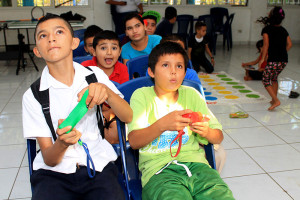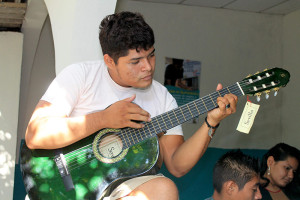A second home for Salvadoran youth
By Iván Enrique FloresMarch 17, 2015
San Salvador—In 75 crime-ridden communities throughout El Salvador, thousands of young people are getting off the streets—where gangs rule—and getting out of their houses— where poverty reigns. As they walk through the front doors of their neighborhood outreach centers, they find themselves in a second home.
“Youth out there just find violence: violence at home, violence in school. That is the reality. The outreach center is a place where youth can learn and change the reality of the streets,” says Elder Monje, a community leader in Ilobasco, a municipality outside of San Salvador.
Ilobasco is one of 13 municipalities taking part in the El Salvador Crime and Violence Prevention Project, which is funded by the U.S. Agency for International Development and implemented by Creative Associates International.
The project’s 75 outreach centers in 13 municipalities display the slogan “Mi Segunda Casa” (“My Second Home”). The outreach centers provide a safe space for young people in these at-risk neighborhoods and offer programs—including recreation, job training, tutoring, life skills support and volunteer opportunities—that keep them off the streets, where they often become victims or perpetrators of violence.
Volunteers with open arms

Although the outreach centers are supported by USAID, the Salvadoran government and an alliance of private sector partners, including top Salvadoran paper La Prensa Gráfica, the day-to-day activities of the centers rely on the dedication of outreach center volunteers and coordinators.
“In the morning we come to the outreach center to help,” says Alexis Ferman, an outreach center volunteer in Quezaltepeque, a municipality in the department of La Libertad near San Salvador. “All the children are already knocking on the door because they enjoy the environment in the center and like to participate in the games and lessons we prepare for them.”
From dance classes to English lessons, computer training and soccer clubs, the volunteers—many of whom are in their teens and twenties and face similar challenges to the youth they serve—keep the drumbeat of outreach center life steady.
Beyond the structured activities they manage, the volunteer coordinators say that what many youth seek and need at the outreach center is support from a caring mentor and friend.
At home, parents are sometimes absent or do not understand the challenges their kids are facing, says Armando Gutierrez, a community leader in Cojutepeque, the capital of the Cuscatlán department, 23 miles from San Salvador.
“Here at the outreach center, they have found all of that,” he says. “There’s always someone who has time for them and talks with them.”
Living in communities with higher than average levels of homicide and climbing rates of immigration as people seek an escape from poverty and violence, many young people in these neighborhoods may be coping with the loss of family or friends to the violence epidemic or immigration. These are issues outreach center coordinators frequently encounter.
“I am always going to listen to them. I am always there for my beneficiaries,” says Karla Portillo, outreach center Coordinator in the southern coastal city of La Unión. “This center’s doors are always open for them. They already know this is their second home. For many of them this is their first home.”
Second home, second chance

For the most vulnerable youth in El Salvador’s most crime-plagued and poverty-stricken barrios, a second home means more than just a place of security. It can mean a second chance at life.
This was the case for Marili Umanzor, who found support from her neighborhood outreach center in La Unión after her parents were killed in a car accident.
“I never had anyone to look after me after that [accident],” she says. “The outreach center coordinator has become my mother because she cares for me and loves me. I have a reason to live now because I have “siblings” here.”
Outreach center coordinators throughout the country are reporting success for youth like Marili and are seeing fewer young people in the streets and more in the centers.
“They have made this place their home,” says Amelia Marroquín, outreach center Coordinator in Nejapa, a municipality in the department of San Salvador. “This is the ideal space for an adolescent; not the street corner.”
Rubén Alejando, a beneficiary of the center in Nejapa, agrees. In fact, he says, his peers are now joining the outreach center’s activities and have “exchanged cigarettes for pencils.”
They are “changing for good,” he says.
Edited by Jillian Slutzker

